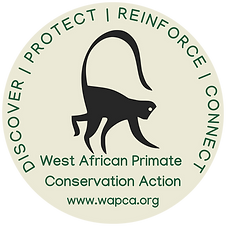





Ankasa-Tano Community Forest Project

The Ankasa-Tano Community Resource Management Area (CREMA) unites twelve communities surrounding the Kwabre Forest Reserve in western Ghana. Supported by WAPCA and the Wildlife Division, the CREMA operates under a locally elected Community Resource Management Committee (CRMC) made up of representatives from each community. Together, they work to protect critical primate habitat, restore degraded forest, and strengthen community livelihoods through sustainable, locally led conservation initiatives.
Implementation and Community Action
Forest Restoration
The Kwabre Forest within the Ankasa-Tano CREMA contains a rich diversity of niche-adapted plant species that thrive in its unique peat-swamp rainforest conditions. Reforestation efforts prioritise the use of sustainably harvested native seedlings to preserve this ecological integrity and ensure long-term forest resilience. Community members have established several nurseries producing thousands of saplings each year, which are planted both in degraded forest areas and within community community plantations. This approach restores habitat for endangered primates while providing sustainable timber and fuelwood sources that reduce pressure on the core rainforest.
Community Patrols and Forest Protection
Illegal logging, mining, and hunting remain major threats to the Ankasa-Tano landscape. To address this, WAPCA and the Wildlife Division have trained Community Rainforest Monitoring Teams composed of local residents. These teams conduct regular patrols throughout the forest, reporting illegal activities and supporting law enforcement. Confiscated materials and fines are redistributed under the supervision of the CREMA Executive Committee, ensuring that conservation benefits are shared equitably among communities and fostering a sense of local stewardship.
Green Value Chains and Sustainable Livelihoods
WAPCA works with its partner Noé and private sector organisations to promote sustainable livelihoods through Green Value Chain initiatives. The organic coconut oil and organic cocoa programmes provide farmers with alternative income streams while encouraging environmentally responsible practices. Farmers are trained in organic certification, cooperative management, and value-added processing. A portion of the proceeds contributes to a conservation fund that supports patrols, reforestation, and community projects, helping to align economic growth with biodiversity protection.
Transboundary Collaboration
Given the proximity of the Ankasa-Tano Rainforest to the Tanoé Forest in Côte d’Ivoire, WAPCA facilitates ongoing collaboration between communities across the border. Joint patrols, training workshops, and information-sharing meetings strengthen protection of this critical habitat corridor and reduce illegal cross-border trade in forest products. Through this partnership, both countries are working towards the establishment of a transboundary community-managed forest reserve to safeguard biodiversity and promote cooperative conservation.
Environmental Awareness and Education
Conservation education remains central to WAPCA’s work. Radio programmes, school outreach, and community sensitisation sessions help raise awareness of sustainable resource use and wildlife protection. By engaging youth and adults alike, the Ankasa-Tano CREMA fosters a shared understanding of how local livelihoods and healthy ecosystems are interconnected, ensuring the long-term sustainability of conservation efforts.

